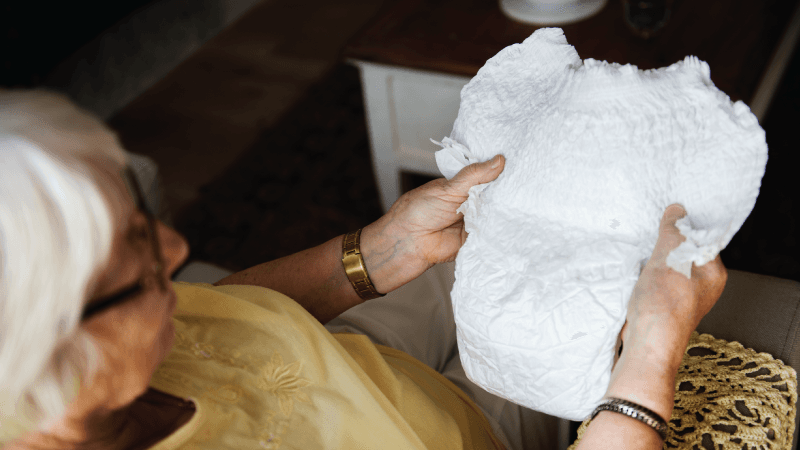Carewell Shopping Guide: Incontinence Supplies Bundle

Written by Chad Birt on Fri Aug 16 2024.

If you care for someone who is incontinent or you’re managing symptoms for yourself, having the right supplies on hand is essential. Tab briefs and pull ons are a good start, but successfully managing symptoms requires a few additional supplies. You’ll want a cream to support skin health and prevent rash and irritation. You'll also want cleansing wipes, and bedding and furniture protection for heavier symptoms.
We’ve created a bundle of our top recommendations for incontinence products to make things easier. This shoppable list has everything you need, designed to keep you or others dry, clean, and comfortable.
1. Absorbent Underwear - Diapers with Tabs & Pull-Ups
There are two types of adult absorbent underwear:
Tab briefs
Choose tab briefs if you or your loved one have urine and bowel incontinence. Most brands hold several large voids and offer 8-12 hours of protection. This makes them a great option if you want to sleep through the night without a change.
Tab briefs are bulkier and less discreet than pull ons, but the adjustable tabs ensure a great fit. They’re also less likely to leak onto bedding and furniture, so they’re a good option for someone with mobility issues or who spends most of the time sitting or lying down.
Pull ons
Pull ons look like regular underwear. They’re made of soft, fabric-like materials and have two leg holes that you step into. Pull ons don’t provide as much protection or absorbency as tab briefs, but they’re a great option if you’re mobile and have light to moderate urinary incontinence. Since they aren’t as bulky, you can wear pull on styles with pants, shorts, and skirts without anyone knowing. The material isn’t as noisy and is much less likely to wrinkle and bunch up.
2. Underpads & Bedding Protection
Incontinence underwear is very absorbent, but it isn’t always enough to prevent accidents. If you’re dealing with heavy symptoms and sit or lie down for long periods of time, it’s normal for leaks to come in contact with furniture and bedding. Thankfully, we carry several products that provide protection and peace of mind. These include:
Large underpads
Medium underpads
Small underpads
Full bed covers
Underpads, or Chux, provide an extra layer of protection for whatever surface you’re sitting or lying on. These products draw moisture to the core, locking in wetness and odors. They’re also gentle on the skin, ensuring your loved one stays comfortable.
Most underpads are disposable and can be tossed after a single use. However, there are also reusable underpads that are machine washable.
Caregiver Tip: Underpads protect bedding, wheelchairs, and furniture. But they can also be used as a changing pad. For example, if you’re running errands and need to change your loved one’s underwear, simply lay an underpad on the backseat. Because the material is durable, you can even use them to adjust your loved one’s position if they’re bedbound.
3. Incontinence Pads - Bladder Pads, Male Guards, Bowel Pads, Etc.
Changing incontinence underwear multiple times a day is tiring. Incontinence pads (different from underpads) can extend the time between changes by providing additional absorbency. There are several types to choose from, including:
Bladder pads - Best for women with small, occasional urinary leaks
Male guards - Best for men who experience mild to moderate urinary incontinence
Pant liners - Best for folks with larger bodies and those wanting overnight support
Belted pads - Best for folks with mild to moderate urinary incontinence who want additional security
Bowel pads - Best for folks with bowel incontinence only
To make selection easier, we’ve broken this category into three sections –– heavy leaks (2 or more full voids per day); moderate leaks (common leaks up to 1 full void per day); and light dribbles (occasional leaks when you laugh or cough). Click on the option that meets you or your loved one’s needs for a complete list of products.
4. Wipes, Washcloths, and Moist Towelettes
After removing soiled underwear, cleaning the skin of the buttocks, groin, and thighs is essential. Any urine or fecal matter left behind increases the risk of rash and skin irritation.
A warm washcloth with mild soap can suffice at home, but if you’re in a hurry or on the go, wipes and moist towelettes can increase your efficiency. These products are disposable, allowing for an easy cleanup. Most also contain soothing ingredients like aloe and lotion, reducing the risk of rashes and dry skin.
5. Barrier Creams & Rash Creams
Wearing incontinence products can significantly affect the health of your or your loved one’s skin. Diapers and pull-ups trap moisture and bacteria, reduce airflow, and cause friction –– all of which can result in irritation, chafing, and infection. These issues can’t be entirely prevented, but barrier and rash creams can help.
Barrier Creams
Barrier creams, like TENA's Proskin Barrier Cream prevent urine and feces from further irritating skin problems, diaper rash, hemorrhoids, and anal fissures. They also contain antifungal and antibacterial ingredients, reducing the risk of yeast and bacterial infections.
Rash creams
Rash creams are made with ingredients like zinc oxide and white petrolatum. Like barrier creams, they protect the skin from moisture. But also contain anti-inflammatory properties that reduce redness, itching, and irritation.
6. Perineal Cleansers & Perineal Wash
Perineal cleansers clean and protect the skin, like barrier and rash creams. The difference is they’re formulated specifically for delicate, hard-to-reach areas like the perineum –– the space between the anus and genitals.
These products are gentler than soap and help break down built-up urine, feces, and smegma (a mixture of oil and dead skin cells that collect in moist skin folds). They also eliminate bacteria and fungi, preventing dermatitis, diaper rash, and moisture lesions.
Get Fast, Free Shipping & 30% Off with Autoship
You can save money by ordering incontinence supplies in bulk, or by signing up for our Autoship & Save program. All new Autoship enrollees get 30% off their first order and an additional 5% off on qualifying products after that. Even better? Most of the incontinence supplies we carry are FSA/HSA-eligible. And, you’ll get free 1-2 day shipping no matter what on any order of $49+.
Questions About Incontinence Supplies? Contact Our Care Team.
If you just started caring for a loved one with incontinence, it’s normal to feel overwhelmed. Our friendly, compassionate Care Team is available to answer questions and make product recommendations.
Whether you need help choosing an overnight diaper or simply want advice on maintaining skin health, we’re here to support you. Call 800-696-2273 to speak to someone in English or Spanish or email support@carewell.com.
Other Articles You May Like

Understanding the Difference Between an HSA and FSA + How to Use These Accounts to Purchase Caregiving Supplies
If your family has recurring medical expenses, you’ve probably considered investing in a tax-advantaged account, like a health savings account (HSA) or a flexible spending account (FSA). Both HSAs and FSAs can help you save money on medical care and supplies, but each has distinct differences. To learn more, we connected with several financial experts. Here, we compare and contrast HSAs and FSAs and provide tips for shopping with either.
Read More >
Why Premium Brand Diapers are Better Than Mass Market Brands
If it's your first time shopping for incontinence products, you might assume all brands are equal. While it’s true that all tab briefs and pull ons have similar features, the difference between premium and mass-market brands is significant. Here, we explain what sets premium diapers apart, and highlight four of our favorite premium diaper manufacturers.
Read More >
Chad Birt is a freelance medical writer who resides in Astoria, Oregon. When he isn't behind a keyboard, you can find him hiking, camping, or birdwatching with his wife Ella and their two dogs, Diane and Thoreau.